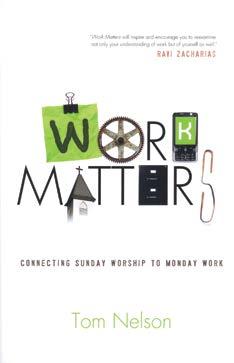
7 minute read
Reviews
Searching for the sweet spot
Work Matters: Connecting Sunday Wor-
Advertisement
ship to Monday Work. By Tom Nelson (Crossway, 2011, 221 pp. $15.99 U.S. $17.99 Cdn.)
Lucky are those who attend Tom Nelson’s congregation in Leawood, Kansas. Lucky because their senior pastor has an invigorating sense of what their daily work means to God.
If your view of work needs a theological makeover, this book is for you. In Nelson’s hands, the daily job is not just a means to earn a paycheck, it’s a way to fulfill your spiritual destiny.
Like many recent books of this type, Nelson roots daily work in God’s design for humanity, visible in the depiction of “God the worker” on page one of the Bible. The grand story of redemption includes our daily toil, and culminates in God’s eventual restoration of all things.
We are created to work, Nelson says, and we are image-bearers of “One of the primary God in both the work we do and ways we tangibly how we do it. Work is not something that love our neighbor exists aside from our faith but something is to do excellent, that both expresses and extends our faith. God-honoring This doesn’t mean we use our jobs as a pulpit but that we work in our various conduct ourselves in a way that brings vocations.” honor to God. Clearly, this lofty vision that vocational theology is part of an integrated Christian faith has been lost in a world where some people merely endure their work as drudgery and others worship it as an idol. Nelson tries to show a better way. He shows a biblical perspective that helps us make the most of our vocations and be a partner with God’s work.
Like a good pastor, he speaks to the hearts in the pews, the same folks who will go back to the trenches the next day. He tries to answer the question, “what difference will it make?” By the time he is done, many readers may be eager to drop the book and hurry back to jobs that have been newly imbued with divine meaning. That work, even if “ordinary,” is thick with purpose, says Nelson. It has intrinsic, not merely instrumental value. It is “not about economic exchange, financial remuneration, or a pathway to the American Dream, but about God-honoring human creativity and contribution.... our specific human contribution to God’s ongoing creation and to the common good.” Part of that ongoing contribution is to serve others by providing the goods and services they need — by helping sustain the world as God’s
“yoked apprentice.”
“One of the primary ways we tangibly love our neighbors is to do excellent, God-honoring work in our various vocations.... Your vocational work is your specific and invaluable contribution to God’s ongoing creation and an essential aspect of God’s Great Commandment to love your neighbor as yourself.... God is transforming us in our work and transforming the world through our work.”
Nelson encourages workers to keep searching for their vocational “sweet spot,” that place on the racquet or bat where the ball can be hit perfectly for maximum power. “Your vocational sweet spot is that place where your creativity is most unleashed, your passions most engaged, and your work makes the greatest contribution to advancing the mission of the organization or business you serve. Identifying your vocational sweet spot is an ongoing process, requiring growing self-awareness through a good conscience and the coaching of wise counselors in your life.”
He offers practical tips on ethics, temptation and burnout. “An exercise that I have found helpful is to regularly make a to-do list as well as a stop-doing list. Sometimes in my workplace I find myself doing things I really do not need to do — things that are not leveraging my workplace calling and contribution to the mission of the organization I serve.”
Sprinkled throughout are sidebars where others describe their journeys to greater workplace meaning (like the following excerpt).
One way Nelson’s book is different than many other recent books on faith and work is his bold linking of vocational awareness with church growth. “Our gospel mission really advances when we faithfully embrace our vocations, whatever and wherever that may be,” he says.
Nelson asserts that the surge of gospel mission in Thessalonians was rooted in robust workplace activity. Those early believers had embraced the gospel and “were honoring Christ in the various vocations and stations of life they were in when they were called.” The gospel at the time was spreading like wildfire in an increasingly mobile Roman world brimming with commerce. “The early church did not just gather together for fellowship and teaching on the first day of the week, but it was scattered the rest of the week in various vocational workplaces. It was in these workplaces that the gospel dynamically spread.”
The bottom line for Nelson is that work indeed matters — not only to individual believers made in the image of “God the worker,” but also to the future expansion of the church. “One of the highest stewardships for local church leadership is to encourage and equip apprentices of Jesus for their work,” he says. — Wally Kroeker
Excerpt: Pleasing God with our work
by Dave Kiersznowski
My wife, Demi, and I started our company in 1991, and I think, like many people, we had good intentions. We wanted to create a decent company, make a decent living, and perhaps do some good. At that point, we thought the “good” would come mostly at the end of the year when we figured out what our profits for the year had been and, therefore, what we should tithe. In the midnineties we started to study the fullness of the Christian story more, including the biblical narrative on vocation. I remember it seemed like water to a dry soul when we began to realize that we were made in the image of a God who worked and who created us to work. I remember for the first time understanding that I could feel God’s pleasure in and through my work every day, not just when the accounting books were closed at the end of the year. And this idea that my Monday through Friday could be a sweet aroma to him, that the essence of my work could be pleasing to him, helped me make the transition from a job to a vocation. And it colored my world, literally.
Demi and I no longer have a sense that there are other more significant or “spiritual” vocations. God made us the way we are, and therefore, as entrepreneurs, we are doing that which he alone determines is our most sacred response to him. And so we try to create a place where every decision matters, where the way we negotiate contracts matters, where the beauty of the buildings we build matters, where the freedom or lack thereof that we create for our colleagues matters. We understand that each and every gift item we create has a story, and that we are implicated in the story it tells. We know that how we and our colleagues treat our partner factories, our UPS or FedEx drivers, the artisans we work with, and the kind of team that cleans our facility every night matters; it’s a reflection of our beliefs and view of work. Each and every day, in the sacred of the mundane, we understand that our vocations matter to God, as he is the one who created and ordained us for those specific roles in life. None are more “spiritual” than others. Rather, we determine daily, through our thoughts and words and actions, whether we choose to honor him through our work. And what a joy it is to sense his pleasure when we ◆ do.
Dave and Demi Kiersznowski own DEMDACO, a gift company based in Kansas City.
Taken from Work Matters: Connecting Sunday Worship to Monday Work by Tom Nelson, © 2011, pp. 32-33. Used by permission of Crossway, a publishing ministry of Good News Publishers, Wheaton, IL 60187, www.crossway.org


